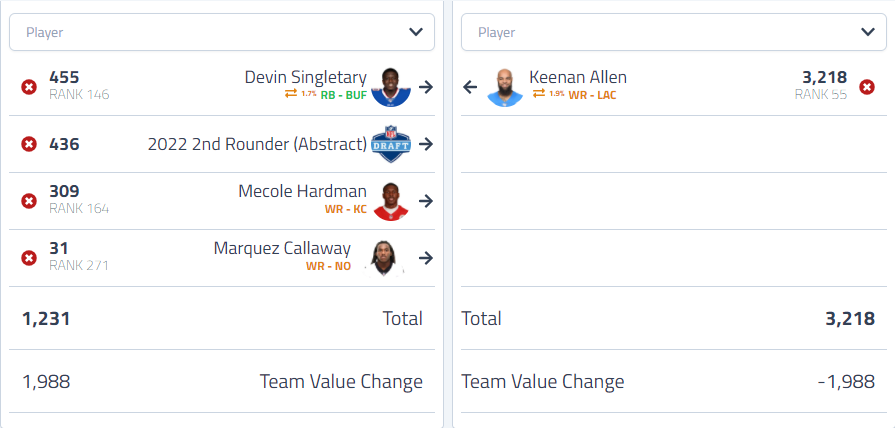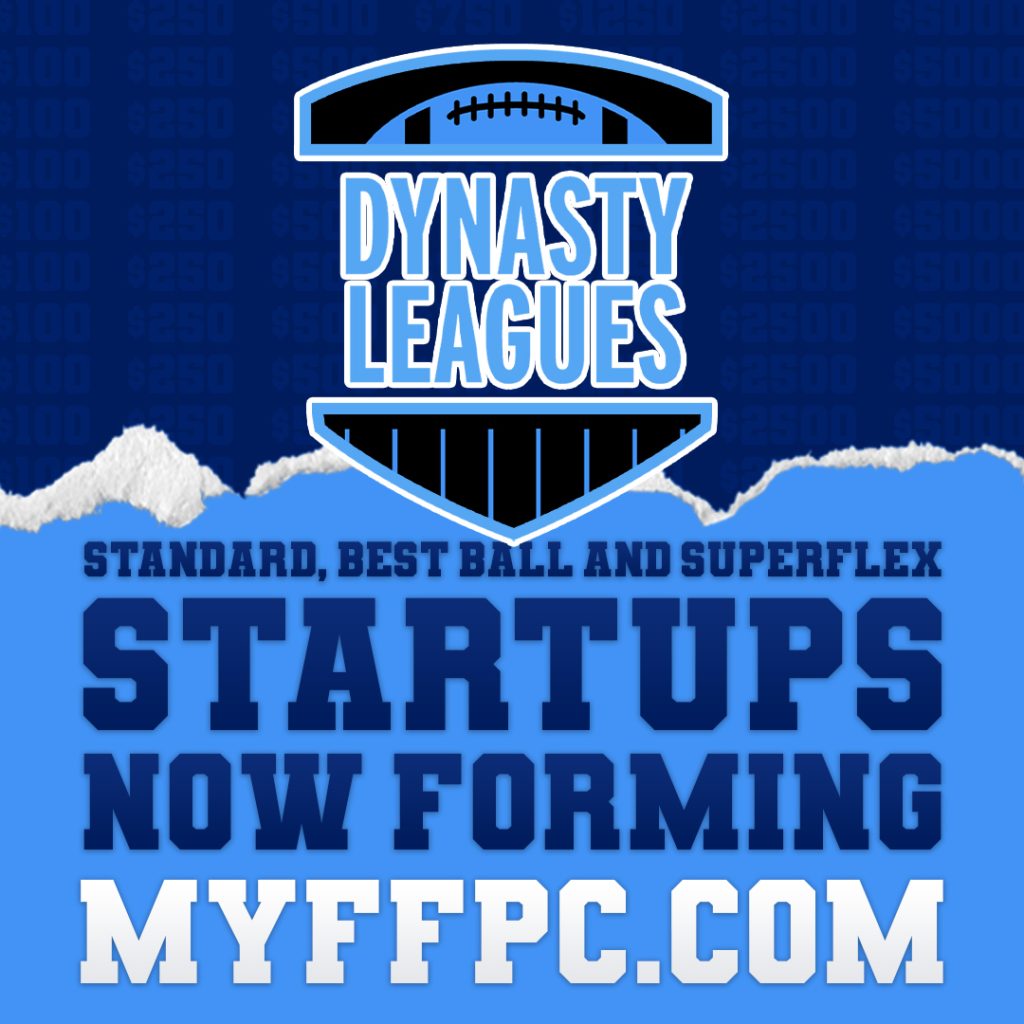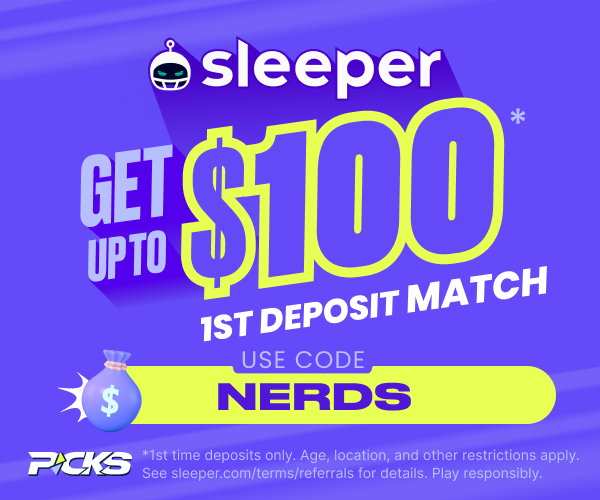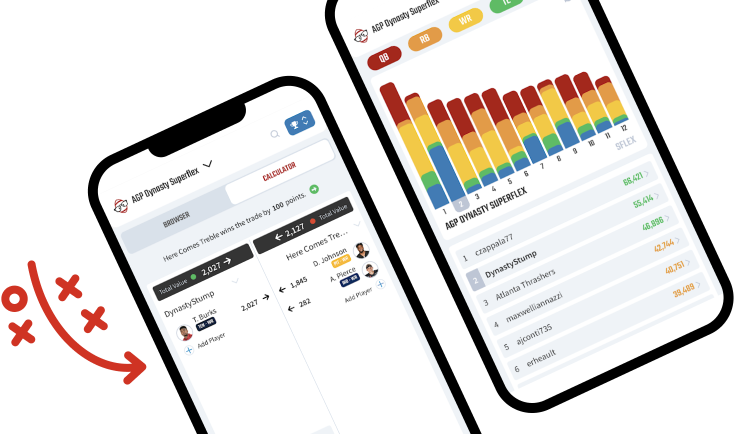“Hey, what do you want for Jefferson?”
This is a message I got in a Sleeper league just last week. On the surface, maybe this isn’t a big deal. An owner is reaching out and at least inquiring about a player. I guess they started a dialog.
But Justin Jefferson is a superstar talent. He had one of the best rookie seasons a wide receiver has ever had in the NFL. He’s 22 years old. He’s healthy. And he is not on my trade block.
So, if you are going to come to me trying to acquire him, can you at least give me something to work with?
This kind of message breaks one of the many unwritten rules of trade etiquette that drive me crazy as a dynasty football owner. Maybe you have sent something like this in the past. Maybe it has even worked. Either way, I am here to tell you that as a good owner, you should cut this out.
Trading in a dynasty league can be challenging at times. Owners see different values in players and (more often than not) do not agree on a fair price. But if you are breaking some of these unwritten rules, you are doing a disservice to yourself and making it even more difficult to make trades happen in your leagues.
The Blind Inquiry
The first rule I will discuss is the blind inquiry, which I gave an example of above.
Starting a dialog with another owner by blindly asking, “What do you want for X player” is not something that is likely to elicit a response. If you are interested in a player on their team, it is because that player has some value. And that owner doesn’t want to just move that player willy nilly. Give them something to work with.
For example, if you know you are willing to at least pay two first-round picks for Justin Jefferson, start the conversation by saying, “Hey, would a 2022 first and a 2023 first for Justin Jefferson interest you as a starting point?” Or you could simply ask, “I see Justin Jefferson as a value of two first-round rookie picks. If I came up with a deal that gave you that value, would you be interested?”
As the Jefferson owner, I now have something to work from to try and form a deal. “I think JJeff is worth more like three firsts. I’d need another good pick or a decent rookie prospect from your team.” Now we have a conversation going. You are not making me do all the work in the negotiations but coming to me with something tangible.
When someone sends me a blind inquiry, it feels like either a) the other owner wants me to build the deal so they can see if they can get the player for cheap or b) they don’t know how to value players, and they want me to do all the work, so that I can give away a player that I already roster.
If you are going to try to acquire a player, give the other owner an initial offer to work from. Otherwise, you are just asking them to do all the work on a deal you initiated.
The Low Ball
We’ve all done it. We have all thought the same thing.
A player gets injured, or a situation changes, and we think, “maybe I can get that guy for cheap now.”
While the idea of getting a steal is always enticing, crossing the line when an offer is just offensive and turns an owner off from ever wanting to work on a deal with you.
For instance, say I decide that I am going to start rebuilding my team. To begin attracting offers, I put a few guys on the trade block. Julio Jones and Adam Thielen are getting up there in age, so I decide it is time to move on from them. After posting both players to the trade block, I get offers that come in like this:
“My 2023 third for Thielen”

I understand that I am making it clear that I am rebuilding and selling off talent, but this isn’t charity. Sure, Thielen is 31 years old, but he was a top-10 WR in every fantasy format last year. Do you want me to wait two seasons for a draft pick that is, at minimum, 25 picks into the rookie draft (assuming 12 team format)?
Some owners respond with, “Well, I didn’t think you’d accept it. I just wanted to start a dialog.” Sorry, that is not an excuse. This falls right in line with the blind inquiry issue. Don’t low-ball me. Give me an actual offer to work with.
Let’s say you think that Thielen is worth a value of two second-round picks. But you don’t want to offer full value right away. Fine. Start by offering a second and a third-round pick. This is at least in the ballpark of starting a conversation and worth responding to you.
Everyone wants to win a trade. You don’t accept a trade without thinking it is a deal that helps your team. Put yourself in the other owner’s shoes and think of why they would want to accept the deal you are offering. If there is no logical reason they would want to accept, then you have a low-ball offer on your hands.
The Over Sell
The opposite end of the spectrum is when you try to convince another owner that the deal they don’t want is good for them.
We often see this when an owner tries to take advantage of a player who has had a sudden shift in value. This can be due to a great weekly performance or an injury to a teammate.
It is never a problem to try and take advantage of a spike in value. In fact, that is the smartest thing you can do. But trying to shove a player down the throats of other owners is never going to get you anywhere in a trade.
Just last week, Travis Etienne was put on the IR after a foot injury in his preseason game against the Saints. In many of my leagues, James Robinson suddenly showed up on the trade block.
That is totally fair play and a reasonable move by these owners. But in one league, the owner who had a Robinson share decided that he would start sending trade offers out to people rapid fire.
I got a notification that I had a trade offer. “Your 2022 first and 2023 first for James Robinson.” Ok, so this guy is taking his shot. Good for him. But I am uninterested. I replied no, as many other owners in this league must-have.
Suddenly this owner was telling everyone on the league message board that two firsts for Robinson is a fair offer and that one of us should want to make the trade because of the lack of depth we all have at running back.
I appreciate the enthusiasm (to a point). But I don’t need another owner explaining why the trade they offered is smart for me, and I am dumb not to take it. We all hold different values for players. We all build our teams with different strategies.
If you send me an offer and I decline, leave it at that. Sure, you can ask if there is any interest and a way to tinker with the proposed deal. But you do not need to insult someone’s intelligence by trying to say they are wrong for not wanting to accept a deal, especially when you are taking advantage of some good fortune from one of your players spiking in value.
The S**t Sandwich
There is value in every player that on your team. But far too often, owners hold these rostered players to a higher value than the person they are dealing with. They have hope in the player’s breakout. The other owner doesn’t have to put false hope on a player they don’t have and won’t value them the same way.
Eventually, some owners get so excited about the potential value they believe it has turned into actual value. Thinking this value exists, they decide to strike while the iron is hot and put together a cluster of hopefuls in a deal for a legitimate producer.
This trade sandwich usually involves three or four fringe players and a draft pick offered for one top-15 player. “I’ll give you Marquez Callaway, Mecole Hardman, Devin Singletary, and a second-rounder for Keenan Allen.” The owner argues that they are giving you depth and talent in multiple areas when all they are really sending is a bunch of scraps for a proven product.

Don’t send these deals. You are just annoying owners who want to get legitimate offers for their good players. If anything, this deal is more of a pain because you are asking the other owner to find roster spots for all the mediocre players you are sending.
Understand the actual value of your players instead of their potential value. Give a legitimate offer. No one is looking to be your garbage man and take all your sub-par players for one of their good ones.
The Renege
The final rule you should never break is retracting on a deal you are offering. Specifically when the circumstances of the players in the deal haven’t changed.
If something drastic happens to a player’s value in a deal, it is not a problem to call off a trade. If you are talking about giving up Saquon Barkley to acquire Dalvin Cook, and Cook gets hurt in practice that day, of course, it is OK to pull the deal off the table.
But if you come to an owner and say, “I’ll give you Barkley and a first for Cook and a second,” that is a clear-cut offer. It may be more informal, and you haven’t actually proposed the deal to the owner on your league site. But you have put an actual offer on the table.
If the owner comes back after looking into the deal and says they are good with that offer, you have a deal. What you cannot do is suddenly say, “On second thought, I am giving up too much. This should just be Barkley for Cook straight up.”
Similarly, if they agree to the deal, you shouldn’t shop the deal around further with other owners to see if you can get something better. A friend asked me about a deal in his league where he was offered a first and third-round pick in 2022 for Mac Jones and his second. When he decided he liked the deal and told the other owner he was in, the owner responded, “Ok, well, I’m going to offer the same deal to [another owner] for Trey Lance instead of Mac. If he says no, then I am in.”
No. That isn’t how negotiating works. If you offer a deal and the other owner accepts, you don’t get to keep offering the deal elsewhere and working out how much talent you can possibly get.
As the other owner in trade talks like this, it is apparent that you are just looking to see how low I will go on an offer before I accept or how much anyone is willing to give you. This is terrible etiquette and should not be tolerated by other owners. If you propose a deal, follow through on it. Do not waste the other owner’s time looking into a deal you won’t ultimately follow through on.
Summary
Making trades is one of the best aspects of dynasty football. Wheeling and dealing the entire year through is why many of us get into dynasty. But if you are going to be a good owner to your fellow league-mates, have some etiquette when trading.
Even if one particular deal doesn’t work out, you are more likely to get a future deal done with an owner when you show that you are a competent trade partner. It may seem crazy to some of you reading this, but some owners will get so annoyed when you break these rules that they don’t bother sending you offers. The work it takes to try and make a deal happen with you isn’t worth the effort.
Everyone wants to get a good deal. Everyone wants to improve their team. But it always takes two to tango. Give your trade partner some respect, and you may find that deals start happening a bit more for you in your leagues.










2 Responses
Thanks!
Excellent article!